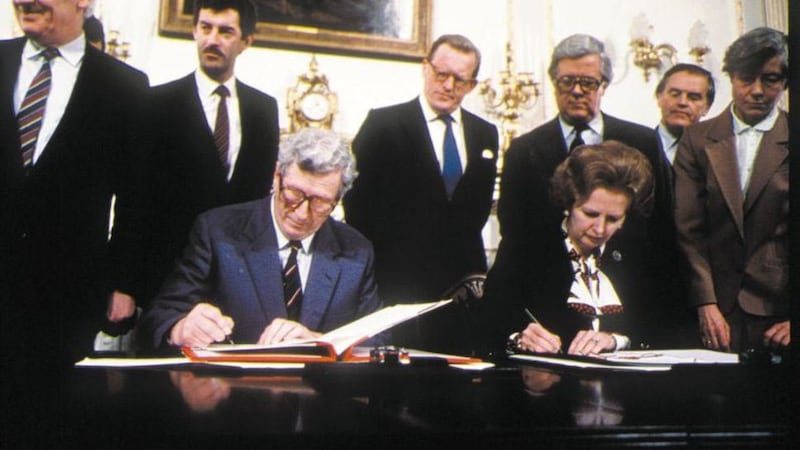IN his recent statement, Lord Morrow, chairman of the DUP, claimed that compared to the 1974 Workers Council Strike and the 1985 loyalist protests against the Anglo-Irish Agreement, the recent unionist protests were of “equal seriousness”. He went on to claim that the authorities have continued to “show total and absolute capitulation to the demands of militant republicanism”. He then stated that the mass loyalist protests in 1985 were responsible for the scrapping of the Anglo-Irish Agreement.
I would like to remind Lord Morrow of the true accurate facts of all these events.
The 1974 Sunningdale power-sharing executive was the product of negotiations and discussions between the UK and Republic of Ireland sovereign governments: The then leader of political unionism, Brian Faulkner; the leader of the SDLP, Gerry Fitt; and the leader of the Alliance Party, Oliver Napier and their party colleagues. The executive was brought down by the unconstitutional strike led by loyalist paramilitaries in cooperation with the Ulster Unionist Coalition led by DUP leader Ian Paisley, Vanguard leader Bill Craig and Harry West of the Ulster Unionist Party. Because the IRA was also opposed to the Sunningdale Agreement it also escalated its campaign of terror during this crisis. Therefore, militant republicanism was on the same side of the argument as unionist extremism.
In 1985 the Anglo-Irish Agreement was the product of two sovereign and democratically elected British and Irish governments. All shades of unionism joined with loyalist paramilitaries to oppose it and there were indeed massive loyalist protests. Sinn Féin/IRA also opposed the agreement so once again the DUP and militant republicanism were on the same side.
Lord Morrow is wrong in stating that it was scrapped because of loyalist protests. It was replaced by the 1998 Good Friday Agreement, which was courageously supported by Ulster Unionist Leader David Trimble who agreed to share power with the SDLP. Because of his decision, Trimble faced vile abuse from Ian Paisley and the DUP, who opposed the Good Friday Agreement. However, less than 10 years later in May 2007, Paisley would agree to share power with former leader of militant republicanism, Martin McGuinness.
The primary cause of recent events, which led to street protests, has been the Northern Ireland Protocol. This is not the consequence of demands of militant republicanism. It is the product of negotiations between 27 democratic EU governments and the UK government designed to maintain Northern Ireland’s access not only to the UK market but to the EU Single Market. Unfortunately, there have been some teething problems arising from this, which EU and UK negotiators are trying to sort out.
The tragic consequence of all three crises is that the PSNI and its predecessor the RUC were forced to put their lives and personal safety on the line in the face of vicious violence in attempting to maintain the peace arising from the irresponsible language and behaviour of extremists on both sides of the divide.
Lord Morrow and his unionist colleagues should cease their undermining of the chief constable. It was the DPP not the chief constable who decided not to prosecute SF members in relation to the Bobby Storey funeral. Like many people throughout the island of Ireland I wish there had have been a different conclusion.
John Cushnahan
Former Leader of the Alliance Party and Former Fine Gael MEP
Unionists must accept the new reality of changing demographics
THE new reality of 2021 with changing demographics should be the tonic that would educate unionists to the fact that the old days of dominance over their nationalist neighbours is at an end.
Unionists can no longer be pandered to especially when they start issuing subtle threats of violence because the protocol is not going away, neither is the border in the Irish Sea and the call for a border poll is well and truly justified as an integral part of the Good Friday Agreement.
Unionists can make claims that they are being marginalised and their concerns not listened to, but they should take heed to the fact that nationalists/republicans were trapped in an unwelcoming statelet born out of the most undemocratic pencil line ever drawn on a map.
Discrimination for them was an everyday occurrence, and that reality cannot be swept under the carpet. In a united Ireland, unionists would have access to the exactly same rights as anyone else.
James Woods
Gort an Choirce
Dún na nGall
So much for parity of esteem
BRIAN Feeney (Column April 14 2021) ‘Unionists have opposed every progressive move to no avail’, conflates unionism, a coherent, rational and legitimate political ideology, with the politics and ideology of the DUP and even with the killing of Catholics. You would never guess from his article that a majority of unionists supported the Good Friday Agreement.
At one time Sinn Féin had a unionist outreach department. I do not know if it still exists, but Ireland’s Future, of which Brian Feeney is a prominent member, seems, on the basis of this article, to have decided that the way forward is the delegitimation and demonisation of unionism. So much for parity of esteem.
Henry Patterson
Emeritus Professor
of Irish Politics







